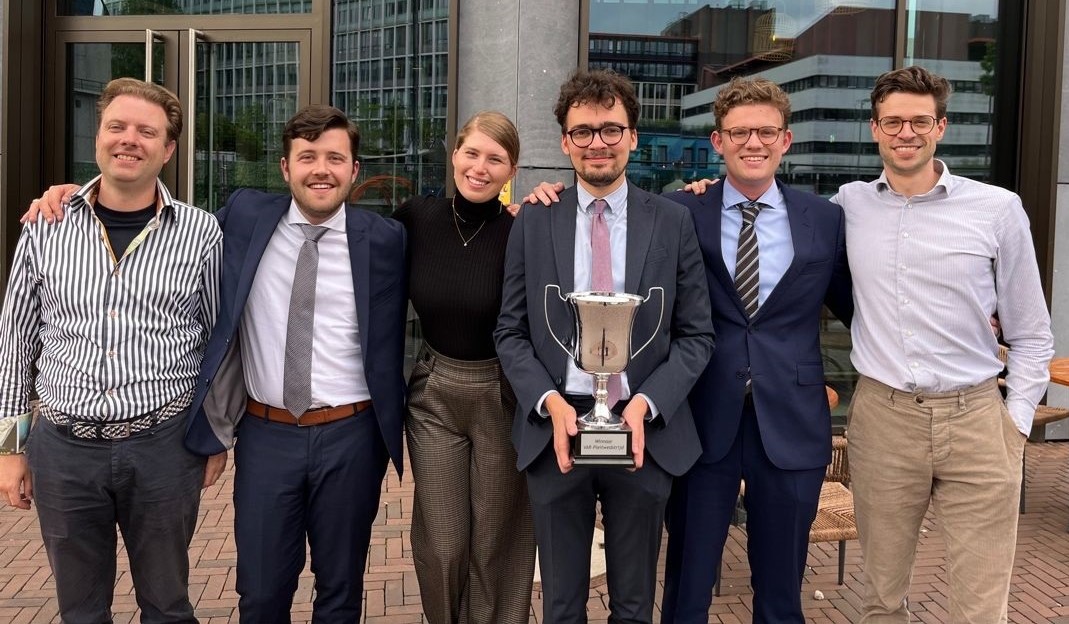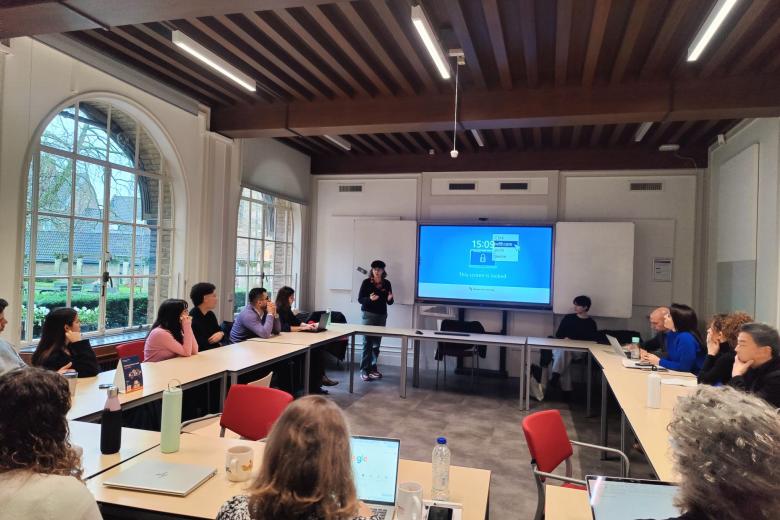Moot Court Competition as a Learning Experience: Maastricht Law Students Win VAR Moot Court Competition
Master students Dutch Law Isabel Bandsma, Ruben Peetam, Youri Quaedvlieg (Constitutional and Administrative Law) and Steven Debie (now graduated from the General Programme) formed the team that represented the Faculty of Law in the VAR moot court competition last year. And with great success: the first prize went to Maastricht on 22 May 2024! They were supervised by coaches Sam Schuite and Bob Assink, both assistant professor in administrative law, Raymond Schlössels, professor of administrative law, and Sander Jansen, associate professor of administrative and constitutional law.

Motivation
For most team members, it was the first time they participated in a moot court competition, including Isabel. ‘You hear about it from others and I was curious to take a look behind the scenes of the legal profession and learn some skills,’ she says. ‘After my first lecture in administrative law, I was asked to participate in the VAR Moot Court Competition.’ On the advice of Ruben, who had already completed a number of moot court competitions, Steven also agreed to participate. ‘I was still hesitant, because I expected it to be a very time-consuming activity. However, the preparation was spread over a longer period, which made it easy to combine. It was a very educational challenge and it would have been a shame to let it pass me by.’ Youri was the last to join the team. ‘I thought a moot court would be an interesting and special experience. I also got along well with the other team members. After an exam, Ruben, Steven and I went for a drink and that's when I signed up.’
About the VAR Moot Court Competition
The VAR Moot Court Competition (in Dutch: VAR Pleitwedstrijd) has been held since 1991. It is organised annually by one of the Dutch law faculties, under the supervision of the VAR (Association for Administrative Law). In this competition, teams from the various faculties compete against each other in an administrative law procedure. The competition consists of a written part, which is completed in the months prior to the oral hearing of the case, and an oral part, the actual moot court competition. The VAR Moot Court Competition is known as one of the most prestigious moot court competitions in the Netherlands.
Preparation
Once the team had been put together, it was time for preparation. ‘From the very beginning, we made the team aware that this was not a criminal law moot court. No, it is a modern administrative law procedure in which you look for a solution,’ says Sam. ‘We practiced that well during our practice sessions at the faculty and at the court in Roermond. Coach Bob had organised these sessions for the team.’ For about five months, the team came together and discussed, wrote, discussed even more and exchanged feedback in order to be as well prepared as possible. ‘We were very well supported throughout the entire preparation,’ says Ruben. ‘Not only Bob and Sam, but also Raymond Schlössels and Sander Jansen provided us with feedback and support at literally every moment of the week, even during the weekends.’ Bob adds: ‘If we get good input, we can give good feedback. That is our starting point. So it all depends on what the students provide.’
Competition procedure
During the competition, the team had to deal with two cases. The first case, which mainly involved written preparation, concerned a complex dispute between a municipality and a group of residents about the arrival of a shelter for status holders in a former hospital. ‘In the written round, you draft documents for one party, the claimant or the administrative body. Another university is the opposing party with whom you exchange documents. You only hear the defences during the first oral round and then you have to argue on the spot,’ Steven explains. ‘The finalists are determined based on the written documents and performances during the oral round.’
In the final, the team got to work on a completely new case. ‘We defended a citizen who had taken in dogs and cats after she had to close her animal shelter because the lease expired. After complaints from local residents, the mayor took quite a strong stance against that citizen. Basically a nuisance dispute,’ Ruben explains. ‘However, we soon managed to talk it into a case about animal welfare, a very smart idea of Steven’s. After all, the woman wanted to take care of animals that would otherwise end up on the streets.’ The final ultimately ended in a settlement. ‘In both cases, we immediately took a step forward and showed flexibility,’ says Steven. ‘We wanted to go to the reasonable middle ground. And yeah, who can be against that?’ Coach Sam nods in agreement: ‘This competition is very close to practice, the judges who appear there also know that. If you show that you are against a settlement, that shows that you have not understood one side of the coin very well. Namely that a good settlement is better than a bad trial.’
Trust in teammates
Everyone worked hard on the written piece, but during the oral rounds there is only room for two spokespersons. ‘We deliberately chose to let one person speak. That is the smartest thing to do, because you start to dilute each other’s arguments or get in each other’s way of thinking if you have two people speaking,’ Ruben explains. Sam adds: ‘This method is also the closest to practice. You have a second who is super important. Ruben’s oral presentation during the final was fantastic, but Steven had a lot of valuable background knowledge and was able to write things down for Ruben in between.’
The team had exactly one hour to prepare the final case. ‘We were placed in a small room where we were closely monitored,’ says Isabel. ‘Our coaches stayed behind and we were not allowed to contact them.’ That was the moment for Sam and Bob to let go of the students, ‘but’, they both say, ‘it felt good’. Bob: ‘I really enjoyed seeing the mutual trust from the sidelines during the final. Where other teams contradicted themselves, our team had a clear message. We didn’t dare to hope for the win yet, but it was in the air.’ After months of preparation, the team was allowed to take the first prize back to Maastricht. ‘We are of course very proud of that, that cup, but I think we all had the same feeling of satisfaction. That we invested so much together to make it a success,’ says Isabel. ‘And you get a great experience in return. You get to know yourself, you find out what suits you and what doesn’t. I mean, if you want to become a lawyer later, you will at least have had the chance to experience what that is like. And that under very good guidance.’ Youri can confirm that: ‘By participating in the VAR Moot Court Competition, I went to my first visit to the administrative judge for my work with a sense of peace.’
Represent the Faculty of Law
You might know by now: participating in the VAR moot court is highly recommended! Are you interested in representing our faculty? Please contact Raymond Schlössels, Bob Assink or Sam Schuite.
Also read
-
Reducing the Digital Divide: Empowering Students to Train, Evaluate, and Use AI Text Models
The Maastricht Law and Tech Lab, together with the Brightlands Institute for Smart Society (BISS), obtained a € 100.000 a Comenius Senior Teaching Fellow grant.
-
Meet the Maastricht Centre for Human Rights
On 8 December, the Meet the Maastricht Centre for Human Rights event took place.
-
Mariam Aroian guest researcher at IGIR
Mariam Aroian will visit IGIR for three months, between December 2025 and February 2026. Her current research focuses on copyright and artificial intelligence.